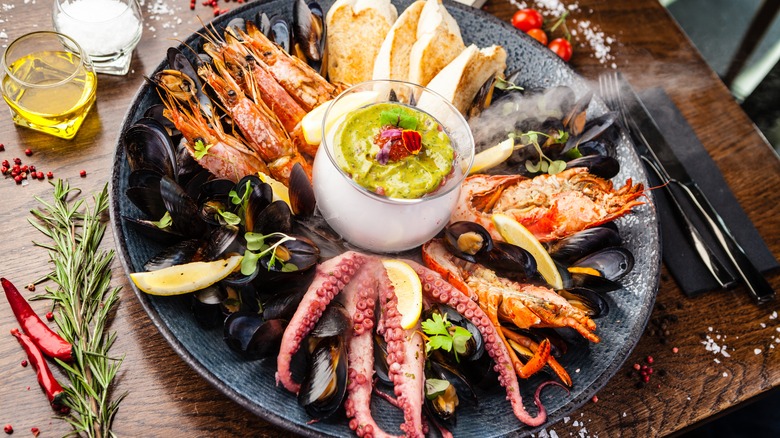Surprising Foods To Avoid If You Have A Seafood Allergy
Fish is one of the best sources of protein and healthy fats, but not everyone can reap its nutritional benefits. About 6.6 million Americans are allergic to seafood, which limits their ability to eat fish, shellfish, or both, reports a 2004 survey published in the Journal of Allergy and Clinical Immunology (JACI). More than half of respondents said they experienced shortness of breath or tightness in their throat after consuming seafood, and 16% had severe reactions that required epinephrine shots. The culprits are parvalbumin and tropomyosin, two allergenic proteins in fish and shellfish, respectively.
Seafood allergies cause mild to severe reactions, such as hives, vomiting, stomach pain, and facial swelling. In some cases, they can lead to anaphylaxis, a life-threatening allergic reaction, explain the specialists at Sydney Children's Hospitals Network. However, you may still be able to consume certain types of fish or shellfish without experiencing side effects. The key is to identify your triggers and then adjust your diet accordingly.
Note that seafood allergies can develop at any age and last a lifetime. About 40% of people with fish allergies and 60% of those with shellfish allergies have their first allergic reaction to these foods in adulthood, according to JACI. Some individuals are allergic to specific types of seafood like tuna or shrimp, while others may experience adverse reactions to most or all types of fish and shellfish. What's even worse is that many foods contain hidden allergens, which may pose challenges when eating out or shopping for groceries.
Hidden sources of fish and shellfish that can trigger allergies
According to a five-year study conducted in 2007 and published in the Journal of Investigational Allergy and Clinical Immunology, hidden allergens are responsible for about 22% of allergic reactions. The same source reports that 35% of people with fish allergies have adverse reactions following the consumption of fish allergens hidden in everyday foods. Unfortunately, many food products may contain hidden allergens and put your health at risk.
If you're allergic to fish or shellfish, think twice before ordering Asian food or ground meat dishes like meatballs, meatloaf, or burgers, warns Southwest Allergy and Asthma Clinic. Several sauces, including Worcestershire and some varieties of BBQ sauce, can also be culprits for allergic reactions as they may contain traces of seafood due to cross-contamination; simply put, they may be processed or cooked in facilities that handle fish or shellfish, according to Allergic Living. You should also be wary of foods that often contain hidden fish or shellfish like bouillabaisse, chowder, some salad dressings, imitation crab, some types of pizza, and spring rolls.
Allergic Living also points out that some cosmetics and skincare products may not be safe either. Likewise, certain dietary supplements, including glucosamine and omega-3s, may contain fish-derived ingredients. Stay on the safe side and double-check the ingredient list before trying new products. When eating out, ask the waiter about the ingredients in your meal or call the restaurant ahead of time to discuss your dietary needs.


